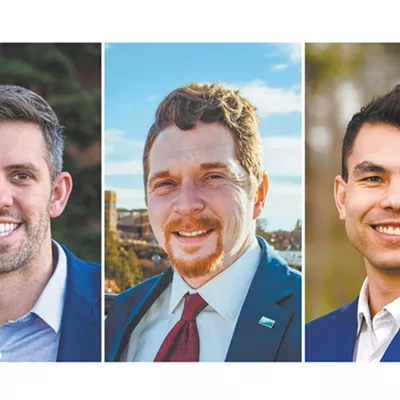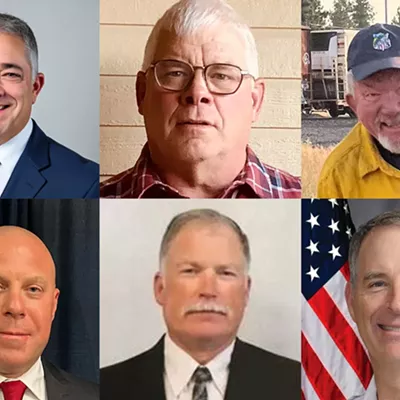I was at the Spokesman-Review several years ago when the door to the photo department burst open and a smiling beanpole of a young woman came out and promptly did a handstand in the middle of the fourth-floor newsroom.
Who the hell is that? people sitting around me harrumphed.
It was Holly Pickett. The Spokesman was still expanding the staff of its Spokane Valley office in 2002 when it gave an internship to Pickett, who had just graduated from University of Montana.
She was ecstatic. Spokane was the Big City for a Montana girl. The S-R at the time had a national reputation for killer photojournalism.
But she only had been there a year when the managers who hired her were gone in a regime change. The Spokesman began shrinking.
“It seemed like an invincible place… It didn’t seem like it would disintegrate so quickly,” Pickett says. She began saving money, purchasing her own photo gear, and started a Website (hollypickett.blogspot.com).
By fall of 2007, during a painful wave of layoffs, she had finished her preparations and walked out under her own steam, setting up shop as a freelancer. In Cairo.
You can tilt the state of Montana and shake out all the people. It would take you 20 times to have enough people to fill up the sweltering ancient city.
“It’s a drastic change!” Pickett exclaims, the blare of car horns audible even during a recent interview via Skype.
Pickett has done weddings in Dubai, a fellowship with a German newspaper, chronicled uprooted Iraqi refugees in Europe and spent half of the last 12 months in Afghanistan bearing witness to a country at war — a country at once war-torn and impoverished and yet so breathtakingly mountainous that it reminded Pickett of her native Montana.
Kabul, Pickett says, has become the last stand for foreign correspondents.Newspapers and television networks across the country are shutting down overseas bureaus in the era of shrinking budgets.
As an independent photographer, Pickett has had to jostle for space at street rallies and news conferences — and for news outlets that will pay for her work. While much mainstream news has remained focused on the Byzantine turns of the country’s presidential election, Pickett has deliberately sought out more human tales.
She’s been fortunate, she says, to have hooked up with NPR, the New York Times, the L.A. Times and The Inlander.
But there have also been stretches where, she says, a newspaper won’t commit to paying for a story in advance, and other instances where she is offered two days’ worth of pay for an assignment that — thanks to unpredictable travel — takes five.
The risk of being kidnapped is real. As are the chances of being blown up by a roadside bomb or shot.
The iffy economics of uncertain income against the daily expenses of food and lodging ($60 a night on the low end for a short-term rental) can skew the reporting, she says.
“Because of the poor state of the industry now, I know a lot of journalists who do military embeds because it’s free. Transportation, food and lodging are free,” Pickett says.
It’s tempting, but “you can’t tell a complete story.”
She has instead gone out with other reporters to witness events no one otherwise might see. Afghanis, sick of war, turning to heroin. Young children traumatized by U.S. air strikes — a haunting face to the term “collateral damage.” Government officials offering cash to grieving survivors to make reparations.
Pickett has found herself in an isolated, rural country where most ordinary people can’t get away from war.
“I just try do the best I can to try and connect with Afghanis on a level where they trust me and can share something with me,” Pickett says. “And I just hope someone on the other end pays attention to this.”
kevin@inlander.com















